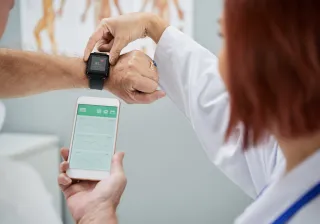Genetic information stored in biobanks brings new opportunities for individualised health care. According to a new study by VTT, tailoring based on genetic information can improve treatment outcomes of blood thinner treatment. There are nearly 400,000 users of blood thinners in Finland, and so the increased understanding of the effects of genetics on the drug therapy potentially benefits a large number of patients.
Antithrombotic medicines that affect blood clotting reduce the formation of blockages in blood vessels. The PreMed study led by VTT examined the association of genetic variants with bleeding and thrombosis among patients taking antithrombotics. The researchers found significant differences in the drug response and in the incidence of thrombosis events between genotypes. Further studies shall determine how the information received might be utilised in selecting medications or determining correct dosages to achieve an optimum treatment result. Genotype-guided drug therapy may reduce adverse drug events and treatment costs.
“The results are a step forward in understanding the potential of personalised medication according to the patient's genetic background. Statins, which are lipid-lowering drugs, are another class of medications in which patients could benefit from personalised treatment”, says Markus Forsberg, Research Professor at VTT.
Protecting data security in research
Biobanks collect biological samples and related data from people who have given the biobank consent. The samples and data are disclosed to research projects aimed at investigating the causes of diseases and to promote public health. The VTT study utilised genome data from three Finnish biobanks. In addition, information about patients’ illnesses, treatments and medications was used from the registers of the Finnish Institute for Health and Welfare (THL) and the Social Insurance Institution of Finland (Kela).
The study indicated that information from biobanks as well as national and regional registers can be utilised without compromising security and privacy. Individual people are not examined in the research, and the material is processed without identifiers. Personal identifiers will remain within the biobanks.
“Finland has high-quality reserves of health data and the infrastructure to utilise it, but collecting research materials for use requires a significant effort from register controllers and data users. In the future, services will be needed for collecting and managing the materials more efficiently to enable their use for the development of health care and health innovations”, says Jaakko Lähteenmäki, Principal Scientist at VTT.
Comprehensive information brings best treatment outcomes
In health care the best treatment outcomes are achieved by utilising all relevant information about the patient. Genetic information is not directly available in the clinical practice, but the physician can order a gene test and use its results in care planning. There are also plans for a genome centre in Finland that would make it easier to use genetic information in health care.
To serve as a backdrop for treatment tailored according to a patient's genetic background, we need better understanding on pharmacogenetics, i.e. linkages between medications and genetics, and the cost-effectiveness of utilising genetic information to guide drug therapy. The availability of health data for use in research also serves companies in developing products for personalized health. Genetic information can be used in the development of new medicines, and in assessing effects of new treatments in different patient groups.
Article on the exploitation of Finnish health data resources has been published in Scandinavian Journal of Public Health: https://doi.org/10.1177/14034948211004421
Article on the pharmacogenetics of warfarin has been published in Clinical Epidemiology: https://doi.org/10.2147/CLEP.S289031
Article on the pharmacogenetics of direct oral anticoagulants has been published in Clinical Pharmacology & Therapeutics: https://doi.org/10.1002/cpt.2316
PreMed project site: https://projectsites.vtt.fi/sites/premed/
PreMed partners:
Avaintec Oy, https://www.avaintec.com
Biopankkien Osuuskunta Suomi - FINBB, https://finbb.fi
Crown CRO Oy, http://crowncro.fi
Oy Karl Fazer Ab, https://www.fazergroup.com
Medaffcon Oy, https://www.medaffcon.fi/en
Mediconsult Oy, https://www.mediconsult.fi/en
Novartis Finland Oy, https://www.novartis.fi
Pfizer Oy, https://www.pfizer.fi
Roche Diagnostics Oy, https://www.roche.fi/
VTT Technical Research Centre of Finland Oy, https://www.vttresearch.com/en






